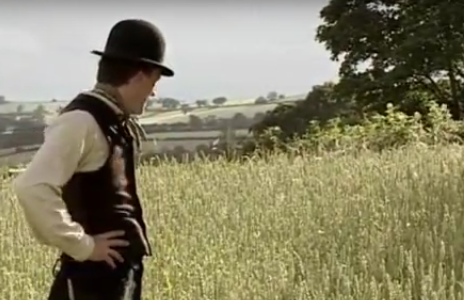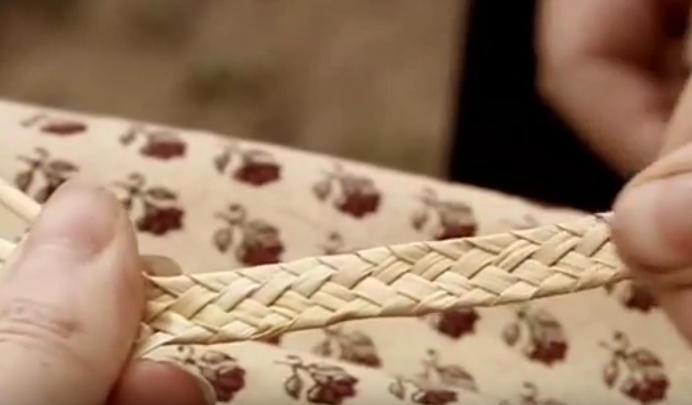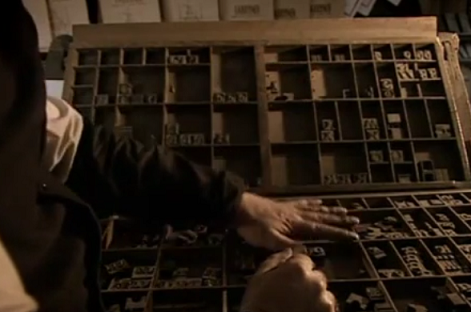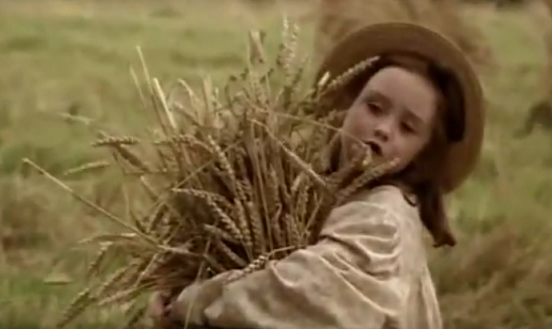We are now at the 6th, and final, episode of The Victorian Farm by the BBC. You can watch the episode for yourself here:
The Victorian Farm Episode 6
<Introduction
Peter, Ruth, and Alex have lived on the farm for almost an entire year now. They have raised pigs, sheep, and poultry. And they planted a wheat and hay. It is now early July, and it is time for harvesting the wheat that they planted!
Lesson 1: You Have to Cut Wheat at Just the Right Time

There are lots of things that can go wrong when you are harvesting a grain. If you are too early, then the grain is too wet and that can lead to spoilage. If you wait too long, then it is too dry. If it rains right when it is perfectly mature, that can ruin it as well.
Lesson 2: Straw Plaiting

When you harvest wheat, you are only keeping the grain that is found in the head. The whole rest of the body of the plant is what we call straw. And farmers have always found good use for this waste product. It is often used as animal bedding or even for insulation in a house. One other use is plaiting (braiding) it together to make a sort of textile. Hats were commonly made from this plaited straw.
Lesson 3: Different Types of Wood Have Different Uses

This is a very important lesson for many different parts of farm life. Here in this episode, they are talking about the different sorts of wood used in making a wheel. The hub is made from elm because it does not split (ask anyone who has tried to hit it with a maul!); the spokes are made of oak for strength; and the rim is made of ash as it is strong and flexible. You will also find some types of wood are good for posts, others are great for buildings, and still others are best for tool handles and such. It is really important to know the use of different woods!
Lesson 4: How to Get a Metal Ring Tire on a Wooden Wheel

In order to get that metal ring around old style tires, the Victorians (and many others) used a very important property of metal. When you heat it up, metal expands; and when you cool it, it shrinks. So, if you get that metal band blazing hot and then cool it down once it is on the wooden wheel, it will fit like a glove!
Lesson 5: Making Beer

Beer was a common beverage back in the Victorian times. In many places, water was not always fit to drink, so they made mildly alcoholic beverages to help make a safe drink. Beer starts with heating up some malted barley in water (keep it at 150 degrees for a couple hours). This will create something called wort. Once that it done, strain the barley from the wort. Then add hops, for flavor, to the wort. The most important ingredient is the yeast which will change the sugar in the wort into alcohol.
Lesson 6: Origin of Uppercase and Lowercase Letters

I just found this part fascinating as I had never really thought about why capital letters were called "uppercase" and the small letters were called "lowercase". It had to do with where the letters were kept for the original printing presses. There were two physical cases of letters: the capital letters were kept in the upper case, and the small letters were kept in the lower case. Interesting, eh?
Lesson 7: Stooking Wheat

Stooking is the process of stacking sheaves of wheat (or other grains) in the field. You basically lean them up against each other. This prevents them from falling over and resting on the ground (which would cause them to rot). In addition, stooking helps to dry the wheat out even more and get it ready for storage.
The Rest of the Episode
As this is the last episode, the remainder of it focused on a celebration. This particular celebration is the harvest celebration and was a popular festival in Victorian England.
The End of Episode 6
Well, that is it! This wraps up episode 6 and the whole series. Not sure which series I will move onto next, but they are all very good and crammed full of information. So join us again soon for another Lessons from the Past.

Very cool!
Love the tidbit about upper and lowercase letters. I always wondered about that...
Excellent tips again! Love the idea of plaiting the wheat. Also, never heard of the upper and lower case letters. Neat fact!
Even "off grid" we have power tools, Netflix, TV, refrigeration, and hot water...
Hat's off to those that CHOOSE to live primitively, and embrace the old world methods of doing EVERYTHING by hand. Great post @slhomestead !!! Thanks...
Thanks for another great write-up! I'll bet Michelle would be a champ at plaiting. She's been practicing on bread for a while... ;~p